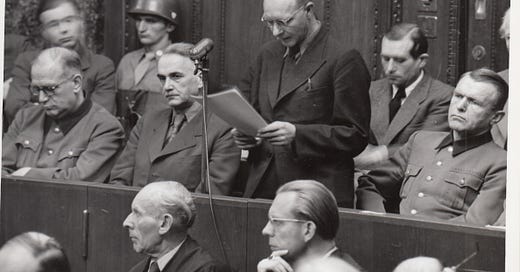1947-07-19, #15: Doctors' Trial (Viktor Brack's personal statement)
THE PRESIDENT: The defendant Brack.
DR. BRACK: Your Honor, in 1929, I joined the NSDAP when more than six million German voters were already backing Hitler. His later successes during the years of peaceful reconstruction consolidated my conviction that he had forever liberated Germany from the misery in which it seemed to have fallen. For all those years, therefore, I had no reason to have any misgivings with regard to Hitler's personality and thus I also believed in the legality of the euthanasia decree as emanated directly from the head of the state. The state officials and doctors, competent for me at that time, told me that the euthanasia had always been an endeavor of mankind and was morally as well as medically justified. Therefore, I never doubted the legal character of the euthanasia decree —
In this connection, however, I was assigned duties, the extent and importance of which I could not foresee. Neither my training nor my qualifications sufficed for this task. Nobody can deny, however my good faith in its justification, I frankly admitted what I did in the framework of the euthanasia measures and tried to prove that my collaboration was merely of a subordinate nature and exclusively directed by human aspects. I cannot be made responsible for later actions carried out by other officers and without my knowledge. These were the measures which I deeply regretted and when the prohibition of the inclusion of foreign nationals and Jews were infringed.
Through my activity in the Fuehrer Chancellery, I early became acquainted with the Gestapo atrocities. The testimonies of my witnesses proves how I fought against them and the concentration camp system without having had any direct knowledge of concentration camps.
I did so because I felt that I was obliged to help those concerned who suffered from the arbitrariness of the Gestapo. I did not do it because I recognized even at that time symptoms of a leadership that always and only knew arbitrariness and oppression.
But this is particularly the reason why I was so shocked about the misuse of some of the euthanasia institutions, for the action 14f13 affected particularly those persons whoso detention I considered unjust and combatted. It was only in this court room however, that I learned of this action.
That I did not hate the Jews has been proved by numerous documents, but without the hatred of the Jews, the participation in the extermination of Jews is hardly tenable. The measures of suppression to which the Jews were subjected forced me to give them the same assistance within my competence as I accorded to the politically pursued persons. I thus helped by my activity hundreds of thousands of persons during the course of the years. But thus only could the sterilization suggestions come into existence. They were nothing but an attempt to prevent the extermination of innumerable Jews.
In spite of all the efforts of my defense counsel, it was impossible to procure the witnesses who could testify to this effect. They preferred to evade their responsibility of serving the truth. I am utterly alone. I must leave it to this High Tribunal to ascertain on the basis of the presented expert scientific opinions that all my proposals were actually so formulated as to show my convictions of their harmlessness, and the impossibility of realizing them.
I must also leave it to the Tribunal to judge whether a man who intended the extermination of the Jews would apply for service with the Army, just at the moment when the aim which he alleges that he pursued was achieved and the extermination measures had started. Or does it not appear paradoxical to assume that one and the same man should give his approval of the extermination of the Jews and in fact aided such a program, and, at the same time, save Jews he has never known, such as Georgi, Passow, Meyer, Warburg, and others, from such measures.
I can only emphasize that particularly these sterilization suggestions to Himmler appeared to me to be the Last possibility to take any action to save Jewery. Had I been indifferent to the Jewish fate, I would not be accused today. But I also tried in this respect, as was my habit, to give assistance and I am still convinced, that it had at least delaying, if not preventative effect. Certainly, the realization that such proposals should never have been made by me on the strength of my medical knowledge or my position at the time, even to the best of my intention, is something I could not reach until this trial was in progress My good intention which was the basis of these proposals and my good will to help by means of them cannot be denied by anybody, and can in no event be understood as my conscientious cooperation in the extermination of the Jews.



